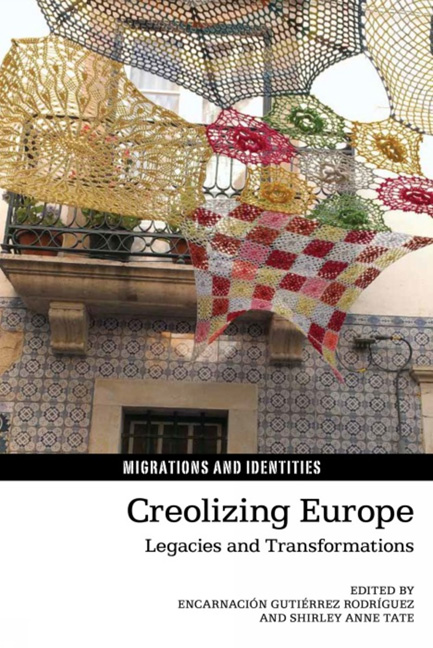
-
- This book is no longer available to purchase from Cambridge Core
- Publisher:
- Liverpool University Press
- Online publication date:
- June 2017
- Print publication year:
- 2015
- Online ISBN:
- 9781781384633
- Subjects:
- Social and Population History, History
Our systems are now restored following recent technical disruption, and we’re working hard to catch up on publishing. We apologise for the inconvenience caused. Find out more: https://www.cambridge.org/universitypress/about-us/news-and-blogs/cambridge-university-press-publishing-update-following-technical-disruption

Creolizing Europe critically interrogates creolization as the decolonial, rhizomatic thinking necessary for understanding the cultural and social transformations set in motion through trans/national dislocations. Exploring the usefulness, transferability, and limitations of creolization for thinking post/coloniality, raciality and othering not only as historical legacies but as immanent to and constitutive of European societies, this volume develops an interdisciplinary dialogue between the social sciences and the humanities. It juxtaposes US-UK debates on ‘hybridity’, ‘mixed-race’ and the ‘Black Atlantic’ with Caribbean and Latin American theorizations of cultural mixing in order to engage with Europe as a permanent scene of Édouard Glissant’s creolization. Further, through a comparative methodological angle, the focus on Europe is broadened in order to understand the role of Europe’s colonial past in the shaping of its post/migrant and diasporic present. ‘Europe’ thus becomes an expanded and contested term, unthinkable without reference to its historical legacies and possible futures. While not all the contributions in this volume explicitly address Edouard Glissant’s approach to creolization, they all engage with aspects of his thinking. All of the chapters explore the usefulness, transferability, and limitations of creolization to the European context. As such, this edited collection offers a significant contribution and intervention in the fields of European Studies, Postcolonial Studies, and Cultural Studies on two levels. First, by emphasizing that race and “cultural mixing” are central to any thinking about and theorization on/of Europe, and second, by applying Glissant’s perspective to a variety of empirical work on diasporic spaces, conviviality, citizenship, aesthetics, race, racism, sexuality, gender, cultural representation and memory.
 Loading metrics...
Loading metrics...
* Views captured on Cambridge Core between #date#. This data will be updated every 24 hours.
Usage data cannot currently be displayed.